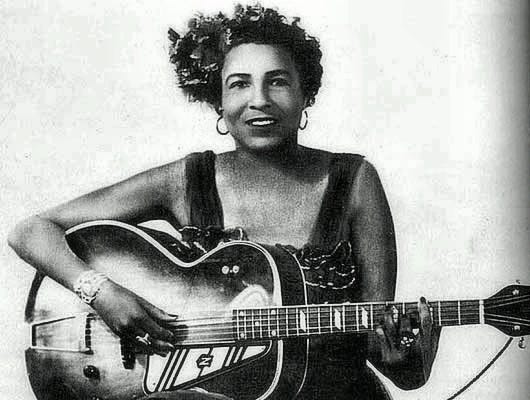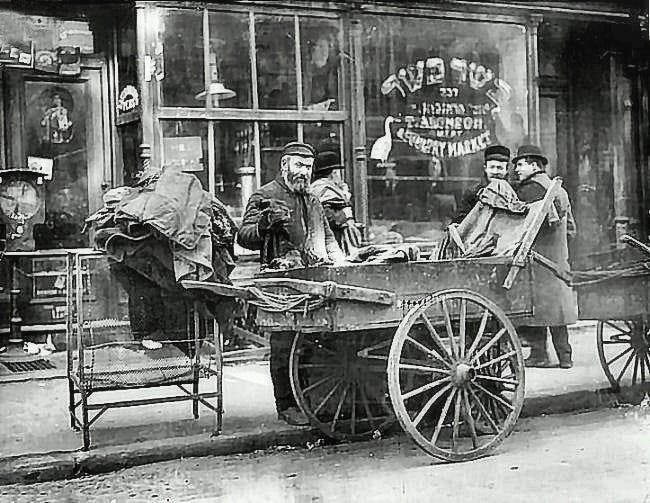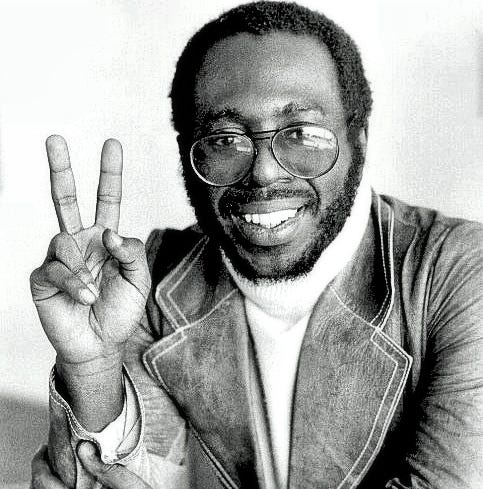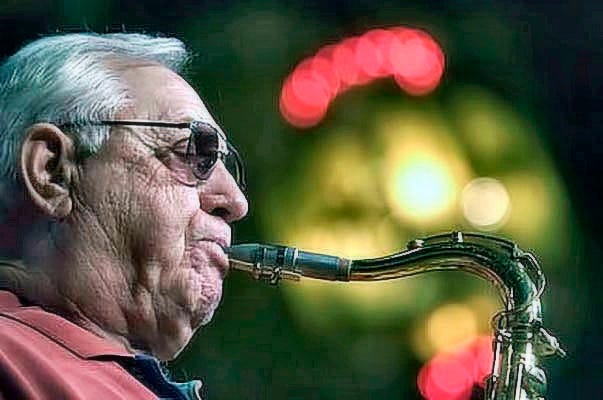Allen Ginsberg, beat poet, was born 97 years ago today
Allen Ginsberg with Frank Beacham, 1975
Allen Ginsberg was born 97 years ago today.
A poet and one of the leading figures of both the Beat Generation of the 1950s and the counterculture that soon would follow, Ginsberg vigorously opposed militarism, economic materialism and sexual repression.
Ginsberg is best known for his epic poem, "Howl," in which he denounced what he saw as the destructive forces of capitalism and conformity in the United States. In 1957, "Howl" attracted widespread publicity when it became the subject of an obscenity trial, as it depicted heterosexual and homosexual sex at a time when sodomy laws made homosexual acts a crime in every U.S. state.
"Howl" reflected Ginsberg's own homosexuality and his relationships with a number of men, including Peter Orlovsky, his lifelong partner.
Judge Clayton W. Horn ruled that "Howl" was not obscene, adding, "Would there be any freedom of press or speech if one must reduce his vocabulary to vapid innocuous euphemisms?"
Ginsberg was a practicing Buddhist who studied Eastern religious disciplines extensively. He lived modestly, buying his clothing in second-hand stores and residing in downscale apartments in New York’s East Village. One of his most influential teachers was the Tibetan Buddhist, the Venerable Chögyam Trungpa, founder of the Naropa Institute, now Naropa University at Boulder, Colorado.
At Trungpa's urging, Ginsberg and Anne Waldman, the poet, started The Jack Kerouac School of Disembodied Poetics there in 1974.
Ginsberg took part in decades of non-violent political protest against everything from the Vietnam War to the War on Drugs. His poem, "September on Jessore Road," calling attention to the plight of Bangladeshi refugees, exemplifies what the literary critic Helen Vendler described as Ginsberg's tireless persistence in protesting against "imperial politics and persecution of the powerless."
His collection, The Fall of America, shared the annual U.S. National Book Award for Poetry in 1974. In 1979, he received the National Arts Club gold medal and was inducted into the American Academy and Institute of Arts and Letters.
In 1986, Ginsberg was awarded the Golden Wreath of the Struga Poetry Evenings in Struga, Macedonia. Ginsberg was a Pulitzer Prize finalist in 1995 for his book Cosmopolitan Greetings: Poems 1986–1992.
Ginsberg died April 5, 1997, surrounded by family and friends in his East Village loft in New York City, succumbing to liver cancer via complications of hepatitis. He was 70 years old.
Here, Allen Ginsberg reads the first part of his poem, Howl
Leonard Cohen meets Allen Ginsberg after his concert at the Wiltern Theatre, Los Angeles, 1988
Photo by Frank Beacham
Josephine Baker was born 117 years ago today.
An American-born dancer, singer and actress, Baker became known as the "Black Pearl," "Bronze Venus" and even the "Creole Goddess."
Born Freda Josephine McDonald in St. Louis, Baker later became a citizen of France in 1937. She was fluent in both English and French. She was the first African-American woman to star in a major motion picture, Zouzou (1934), or to become a world-famous entertainer.
Baker, who refused to perform for segregated audiences in America, is also noted for her contributions to the Civil Rights Movement. She was once offered unofficial leadership in the movement in the United States by Coretta Scott King in 1968, following Martin Luther King, Jr.'s assassination. Baker, however, turned down the offer.
She was also known for assisting the French Resistance during World War II, and received the French military honor, the Croix de guerre.
A dancer, Baker traveled to Paris for a new venture and opened in "La Revue Nègre" on October 2, 1925 at the Théâtre des Champs-Élysées. She became an instant success for her erotic dancing and for appearing practically nude on stage.
After a successful tour of Europe, she broke her contract and returned to France to star at the Folies Bergère, setting the standard for her future acts. She performed the Danse sauvage, wearing a costume consisting of a skirt made of a string of artificial bananas.
Her success coincided (1925) with the Exposition des Arts Décoratifs that gave birth to the term "Art Deco," and also with a renewal of interest in non-western forms of art, including African.
Baker became the most successful American entertainer working in France. Ernest Hemingway called her "the most sensational woman anyone ever saw."
In addition to being a musical star, Baker also starred in three films that found success only in Europe: the silent film, Siren of the Tropics (1927), Zouzou (1934) and Princesse Tam Tam (1935). She also starred in Fausse Alerte in 1940.
At this time she also scored her most successful song, "J'ai deux amours" (1931), and became a muse for contemporary authors, painters, designers and sculptors, including Langston Hughes, Ernest Hemingway, F. Scott Fitzgerald, Pablo Picasso and Christian Dior.
Although based in France, Baker supported the American Civil Rights Movement during the 1950s. When she arrived in New York with her husband, Jo, they were refused reservations at 36 hotels because she was black. She was so upset by the treatment that she wrote articles on the segregation in the United States and began traveling farther south.
She gave a talk at the all-black Fisk University in Nashville, her subject being "France, North Africa and The Equality Of The Races In France." In addition, she refused to perform for segregated audiences in the United States even after she was offered $10,000 by a Miami club. (The club eventually met her demands.)
Her insistence on mixed audiences helped to integrate shows in Las Vegas, then one of the most segregated cities in America. After this incident, she began receiving threatening phone calls from the Ku Klux Klan but said that she was not afraid of them.
In 1951, Baker made charges of racism against Sherman Billingsley's Stork Club in Manhattan, where she alleged that she had been refused service.
Actress Grace Kelly, who was at the club at the time, rushed over to Baker, took her by the arm and stormed out with her entire party, vowing never to return (although she did in fact appear there on January 3, 1956 with Prince Rainier of Monaco). The two women became close friends after the incident.
In 1963, she spoke at the March on Washington at the side of Martin Luther King, Jr. Baker was the only official female speaker and while wearing her Free French uniform emblazoned with her medal of the Légion d'honneur she introduced the "Negro Women for Civil Rights."
Rosa Parks and Daisy Bates were among those she acknowledged and both gave brief speeches.
On April 8, 1975, Baker starred in a retrospective revue at the Bobino in Paris, Joséphine à Bobino 1975, celebrating her 50 years in show business. The revue, financed notably by Prince Rainier, Princess Grace and Jacqueline Kennedy Onassis, opened to rave reviews.
Demand for seating was such that fold-out chairs had to be added to accommodate spectators. The opening-night audience included Sophia Loren, Mick Jagger, Shirley Bassey, Diana Ross and Liza Minnelli.
Four days later, Baker was found lying peacefully in her bed surrounded by newspapers with glowing reviews of her performance. She was in a coma after suffering a cerebral hemorrhage. She was taken to Pitié-Salpêtrière Hospital, where she died at age 68 on April 12, 1975.
Here, Baker is shown doing her Banana Dance in Paris, 1927
Memphis Minnie was born 126 years ago today.
Originally named Lizzie Douglas, Memphis Minnie was a blues guitarist, vocalist and songwriter whose recording career lasted from the 1920s to the 1950s. She recorded around 200 songs, some of the best known being "Bumble Bee," "Nothing in Rambling" and "Me and My Chauffeur Blues."
Born in Algiers, Louisiana, Douglas was the eldest of 13 siblings. Her family called her "Kid" throughout her childhood because she never liked the name "Lizzie." When she first began performing, she played under the name Kid Douglas. When she was seven she and her family moved to Walls, Mississippi, a town a little to the South of Memphis.
The following year she received her first guitar for Christmas, and learned to play banjo by the age of 10 and guitar by the age of 11. She then started playing local parties.
In 1910, at the age of 13, she ran away from her home to live on Beale Street in Memphis. She played on street corners for most of her teenage years, although she would periodically return to her family's farm when she ran out of money. Her sidewalk performances led to a four-year tour of the South with the Ringling Brothers Circus from 1916 to 1920.
Eventually she came back to Beale Street and got involved in the blues scene. At the time, women, whiskey and cocaine were high in demand with the people and places she would be around. She made her money by playing guitar, singing and prostitution, which was not uncommon at the time, since many female performers also worked as prostitutes because of financial desperation.
In 1929, she and Kansas Joe McCoy, her second husband, began to perform together. They were discovered by a talent scout of Columbia Records in front of a barber shop where they were playing for dimes. When she and McCoy went to record in New York, they were given the names Kansas Joe and Memphis Minnie by a Columbia A&R man.
During the next few years, she and McCoy released a series of records, performing as a duet. In February, 1930, they recorded the song, "Bumble Bee," for the Vocalion label. This became one of Minnie's most popular songs, and she eventually recorded five versions of it.
A famous anecdote from Big Bill Broonzy's autobiography, Big Bill Blues, recounts a cutting contest between Minnie and Broonzy. It took place in a Chicago Nightclub on June 26, 1933, for the prize of a bottle of whiskey and a bottle of gin.
Each singer was to sing two songs, and after Broonzy sang "Just a Dream" and "Make My Getaway," Minnie won the prize with "Me and my Chauffeur Blues" and "Looking the World Over."
Minnie continued to record into the 1950s, but her health began to become a problem for her. With public interest in her music declining, she retired from her musical career. In 1957, she and Lawlars returned to Memphis. Periodically, she would appear on Memphis radio stations to encourage young blues musicians. She suffered a stroke in 1960, which caused her to be wheelchair-bound.
The following year her husband, Earnest “Little Son Joe” Lawlars died, and Minnie had another stroke a short while after. She could no longer survive on her social security income so magazines wrote about her and readers sent her money for assistance. She spent her last years in the Jell Nursing Home in Memphis, where she died of a further stroke in 1973.
A headstone paid for by Bonnie Raitt was erected by the Mt. Zion Memorial Fund on October 13, 1996 with 35 family members in attendance including her sister, numerous nieces (including Laverne Baker) and nephews. The ceremony was taped for broadcast by the BBC.
Her headstone is marked:
Lizzie "Kid" Douglas Lawlers
aka Memphis Minnie
The inscription on the back of her gravestone reads:
"The hundreds of sides Minnie recorded are the perfect material to teach us about the blues. For the blues are at once general, and particular, speaking for millions, but in a highly singular, individual voice. Listening to Minnie's songs we hear her fantasies, her dreams, her desires, but we will hear them as if they were our own."
Memphis Minnie has been described as "the most popular female country blues singer of all time," while Big Bill Broonzy said that she could "pick a guitar and sing as good as any man I've ever heard."
Minnie lived to see her reputation revived in the 1960s as part of the general revival of interest in the blues. "Me and My Chauffeur Blues" was recorded by Jefferson Airplane on their debut album Jefferson Airplane Takes Off, with Signe Anderson as lead vocalist.
"When the Levee Breaks," a 1929 Memphis Minnie and Kansas Joe McCoy song, was covered (with slightly altered lyrics and a different melody) by Led Zeppelin and released in 1971 on their fourth album.
Here, Memphis Minnie performs “Me and My Chauffeur Blues” recorded in Chicago, 1941
The English muffin did not come from England, but was invented in New York City.
Thomas English Muffins were invented at 163 Ninth Avenue. That’s where Samuel Bath Thomas, an immigrant from England, set up his bakery when he moved to the city in 1874.
By 1880, he was cooking up the muffins (similar to British crumpets) and delivering them to “hotel and restaurant by pushcart.” Soon, he needed to open up a second bakery — this one on nearby 20th Street between Eighth and Ninth Avenues.
When Thomas died in 1919, his family took over the business, eventually selling it and abandoning both locations. The ovens in the West 20th Street building were discovered by its occupants in 2006. It is now called “The Muffin House” and a brass plaque tells the building’s history on its walls.
Thanks New York Times!
Jimmy Rogers, Chicago blues singer, guitarist and harmonica player, was born 99 years ago today.
A member of Muddy Waters' band of the 1950s, Rogers also had solo hits on the R&B chart with "That's All Right" in 1950 and "Walking By Myself" in 1954. He withdrew from the music industry at the end of the 1950s, only returning to recording and touring in the 1970s.
Born James A. Lane in Ruleville, Mississippi, Rogers was raised in Atlanta and Memphis. He adapted the professional surname Rogers from his stepfather's last name.
Rogers learned the harmonica alongside his childhood friend, Snooky Pryor, and as a teenager took up the guitar and played professionally in East St. Louis, Illinois. There he played with Robert Lockwood, Jr. among others, before moving to Chicago in the mid-1940s.
By 1946, he had recorded as a harmonica player and singer for the Harlem record label run by J. Mayo Williams. Rogers' name did not appear on the record, which was mislabeled as the work of "Memphis Slim and his Houserockers."
In 1947, Rogers, Muddy Waters and Little Walter began playing together as Muddy Waters' first band in Chicago (sometimes referred to as "The Headcutters" or "The Headhunters" due to their practice of stealing jobs from other local bands).
While they played together, each band member recorded and released music as solo artists. The first Muddy Waters band defined the sound of the nascent "Chicago Blues" style (more specifically "South Side" Chicago Blues). Rogers made several more sides of his own with small labels in Chicago, but none were released at the time.
He began to enjoy success as a solo artist with Chess Records in 1950, scoring a hit with "That's All Right," but he stayed with Muddy Waters until 1954. In the mid-1950s, he had several successful releases on the Chess label, most featuring either Little Walter Jacobs or Big Walter Horton on harmonica, most notably "Walking By Myself."
As the 1950s drew to a close and interest in the blues waned, he gradually withdrew from the music industry. In the early 1960s, Rogers briefly worked as a member of Howling Wolf's band, before quitting the music business altogether for almost a decade.
He worked as a taxicab driver and owned a clothing store that burned down in the 1968 Chicago riots that followed the assassination of Dr. Martin Luther King, Jr.
He gradually began performing in public again, and in 1971 when fashions made him a reasonable draw in Europe, Rogers began occasionally touring and recording, including a 1977 reunion session with his old bandleader Muddy Waters. By 1982, Rogers was again a full-time solo artist. He continued touring and recording albums until his death from colon cancer in Chicago in 1997.
He was survived by his son, Jimmy D. Lane, who is also a guitarist and a record producer and recording engineer for Blue Heaven Studios and APO Records.
Here, Rogers, accompanied by James Cotton, performs “Walking By Myself” in 1985
Curtis Mayfield was born 81 years ago today.
A soul, R&B and funk singer, songwriter and record producer, Mayfield is best known for his anthemic music with The Impressions during the Civil Rights Movement of the 1960s, and for composing the soundtrack to the blaxploitation film, Super Fly.
Mayfield is highly regarded as a pioneer of funk and of politically conscious African-American music. He was also a multi-instrumentalist who played the guitar, bass, piano, saxophone and drums.
Born in Chicago, Mayfield's father left the family when he was five and his mother moved Curtis and his siblings into various Chicago projects before settling at the Cabrini–Green projects.
When Mayfield reached his teenage years, he attended Wells Community Academy High School. He dropped out of high school early to become lead singer and songwriter for The Impressions, then went on to a successful solo career.
Perhaps most notably, Mayfield was among the first of a new wave of mainstream African-American R&B performing artists and composers injecting social commentary into their work. This "message music" became extremely popular during the 1960s and 1970s.
Two significant characteristics distinguish Mayfield's sound. First, he taught himself how to play guitar, tuning it to the black keys of the piano, thus giving him an open F-sharp tuning — F#, A#, C#, F#, A#, F# — that he used throughout his career.
Second, he primarily sang in falsetto register, adding another flavor to his music. This was not unique in itself, but most singers sing primarily in the modal register.
Mayfield's career began in 1956 when he joined The Roosters with Arthur and Richard Brooks and Jerry Butler. Two years later, The Roosters, now including also Sam Gooden, became The Impressions. The band had one big hit with "For Your Precious Love."
After Butler left the group and was replaced with Fred Cash, (a returning original Roosters member), Mayfield became lead singer, frequently composing for the band, starting with "Gypsy Woman," a Top 20 pop hit. Their hit "Amen" (Top 10), an updated version of an old gospel tune, was included in the soundtrack of the 1963 MGM film, Lilies of the Field, which starred Sidney Poitier.
The Impressions reached the height of their popularity in the mid-to-late-'60s with a string of Mayfield compositions that included "Keep on Pushing," "People Get Ready," "It's All Right" (Top 10), the uptempo "Talking about My Baby"(Top 20), "Woman's Got Soul," "Choice of Colors"(Top 20), "Fool For You," "This is My Country" and "Check Out Your Mind."
Mayfield had written much of the soundtrack of the civil rights movement in the early 1960s, but by the end of the decade he was a pioneering voice in the black pride movement along with James Brown and Sly Stone.
Mayfield's "We're a Winner," a #1 soul hit which also reached the Billboard pop Top 20, became an anthem of the black power and black pride movements when it was released in late 1967.
His earlier "Keep on Pushing" (whose title is quoted in the lyrics of "We're a Winner" and also in "Move On Up") had been an anthem for Martin Luther King, Jr. and the Civil Rights Movement.
On August 13, 1990, Mayfield was paralyzed from the neck down after stage lighting equipment fell on him at an outdoor concert at Wingate Field in Flatbush, Brooklyn, New York. He was unable to play guitar, but he wrote, sang and directed the recording of his last album, New World Order. Mayfield's vocals were painstakingly recorded, usually line-by-line while lying on his back.
In February, 1998, he had to have his right leg amputated due to diabetes. He died from diabetes on December 26, 1999 at the North Fulton Regional Hospital in Roswell, Georgia. His health steadily declined following his paralysis.
Mayfield has left a remarkable legacy for his introduction of social consciousness into R&B and for pioneering the funk style.
Many of his recordings with the Impressions became anthems of the Civil Rights Movement in the 1960s, and his most famous album, Super Fly, is regarded as an all-time great that influenced many and truly invented a new style of modern black music.
Here, Mayfield performs “People Get Ready”
Boots Randolph, master sax player, was born 96 years ago today.
Randolph was best known for his 1963 saxophone hit, "Yakety Sax," Benny Hill's signature tune. It reached #35 in 1963 and stayed on the charts for nine weeks.
Randoph was a major part of the "Nashville Sound" for most of his professional career.
Born in Paducah, Kentucky, and raised in Cadiz, Kentucky, Randolph attended high school in Evansville, Indiana. At the end of World War II, he played saxophone, trombone and vibraphone in the United States Army Band. After his service in the Army, he played with Dink Welch's Kopy Kats in Decatur, Illinois, from 1948 to 1954.
He briefly resided in Louisville, Kentucky before returning to Decatur to start his own group. He left Decatur in 1957.
During his more than forty year career, Randolph performed in hundreds of venues alongside many artists in pop, rock, jazz and country music. He played on many recording sessions with Elvis Presley and also performed on soundtracks for a number of Presley's motion pictures — one popular song being "Return to Sender."
Randolph recorded for Monument Records in Nashville and played on Roy Orbison's 1963 hit, "Mean Woman Blues." He was also featured on "Little Queenie" by REO Speedwagon, "Java" by Al Hirt, "Turn On Your Love Light" by Jerry Lee Lewis and "Rockin' Around the Christmas Tree" by Brenda Lee.
Early in his career, he often billed himself as Randy Randolph. He was also successful on Billboard Magazine’s album charts, having fourteen entries between 1963 and 1972. Boots With Strings from 1967 reached #36 and stayed on the chart for nearly two years.
In 1977, Randolph opened a successful club of his own in Nashville's "Printer's Alley." He also frequently appeared on the television program, Hee Haw, and was a member of the Million Dollar Band.
On July 3, 2007, Randolph died at Skyline Medical Center in Nashville after suffering a brain hemorrhage. He had marked his 80th birthday only a month prior to his death.
Here, Randolph performs a medley of his hits
Jukin’ at Thompson Grocery, Mississippi
Photo by Bill Steber











